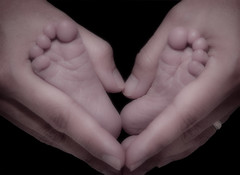Choosing happiness. It’s been a bit of a theme for the year—one of my resolutions, one of our Group Writing Projects (oh, man, looks like it’s about time for one of those again). It’s something we hear about a lot.
And now I finally know what it means.
Surprisingly, it has a lot to do with why, when I talk about how heart-rendingly difficult stay-at-home motherhood can be, people tell me I should get a job.
It’s because we don’t know how to be happy.
—Liz C, in a comment at Segullah
Choosing to be happy does not mean that we will automatically be happy all the time. It doesn’t mean we always choose whatever might make us happy right this second.
Choosing happiness means we choose the things we know are most important for our long term happiness.
The analogy that keeps springing to my mind is one of food. I like donuts and ice cream and cake and pie . . . I could go on, but you get the idea. Food does make me happy, treats especially. I do the grocery shopping, so if I wanted to, I could stock up on these things every week and eat them every meal.
But I can’t choose cake and ice cream all the time. Yeah, I’d enjoy eating it (to a point), but I would soon get sick, gain weight, and miss out on vital nutrients. (Scurvy, anyone? Oh and PS tooth decay?)
 To be happy with my body (liking how I look) and happy in my body (not feeling like crap), I have to make healthier choices. I do enjoy eating healthier foods, too, though not as much as my sugary treats.
To be happy with my body (liking how I look) and happy in my body (not feeling like crap), I have to make healthier choices. I do enjoy eating healthier foods, too, though not as much as my sugary treats.
The same goes for my day-to-day activities. I could ignore my kids all day, plunk myself down in front of the computer and them in front of the TV (where we are now, thank you), but we all end up grumpy and lazy.
Choosing happiness means doing what I may not want to do most right now—it means choosing the thing that I know is right for me, what’s important in the long run.
Staying home with my children all day may not be an endless delight for me. There are diapers and housekeeping and tantrums and nap strikes. But I believe the most important contribution a person can make to the world is to raise their children right, to show them love, to give them their personal attention. I know that in twenty years, my successful marketing campaigns won’t be what warms the cockles of my heart.
By choosing to raise my children myself, I’m choosing a long, hard road—but one that leads to real, long-term happiness.
What do you think? Are you giving up treats today so you don’t vomit tomorrow?
(More thoughts on how to choose happiness as a mom here.)
Photo by Swamibu
 Some people think I do too many things. I feel like I don’t do enough.
Some people think I do too many things. I feel like I don’t do enough. That’s exactly what I wanted to talk about today. We’ve alluded to this conversation before, but what do you to water your grass? What do you do to put things into perspective, to remember how much you love this life you’ve chosen?
That’s exactly what I wanted to talk about today. We’ve alluded to this conversation before, but what do you to water your grass? What do you do to put things into perspective, to remember how much you love this life you’ve chosen? Of the 4000 working women surveyed, 63% said their jobs are “just a paycheck,” and 79% said they want something better for their children when asked if they want their kids to follow in their footsteps.
Of the 4000 working women surveyed, 63% said their jobs are “just a paycheck,” and 79% said they want something better for their children when asked if they want their kids to follow in their footsteps. Today, this is just a reminder to remember you love your kids. I think that love is an important part of finding fulfillment in motherhood. When it boils down to it, it just may be the most important step in that process. It’s the biggest benefit of motherhood—but sometimes it’s easy to get so caught up in the drudgery and the doldrums that we forget how much we care.
Today, this is just a reminder to remember you love your kids. I think that love is an important part of finding fulfillment in motherhood. When it boils down to it, it just may be the most important step in that process. It’s the biggest benefit of motherhood—but sometimes it’s easy to get so caught up in the drudgery and the doldrums that we forget how much we care. And what sort of respect and admiration do you expect to get when the ones to benefit from the choice you made are your immediate family, as compared to someone whose choices benefit many hundreds of people? In other words, if your choice is to be a full-time mother, you can expect to receive the respect and admiration of your family because they are the ones who benefit, but why would you expect to receive any acknowledgement from other people who gain nothing from your choice? If your choice is to be an astronaut, you can expect to receive the respect and admiration of everyone whose life your work touches.
And what sort of respect and admiration do you expect to get when the ones to benefit from the choice you made are your immediate family, as compared to someone whose choices benefit many hundreds of people? In other words, if your choice is to be a full-time mother, you can expect to receive the respect and admiration of your family because they are the ones who benefit, but why would you expect to receive any acknowledgement from other people who gain nothing from your choice? If your choice is to be an astronaut, you can expect to receive the respect and admiration of everyone whose life your work touches.
 Or, as
Or, as